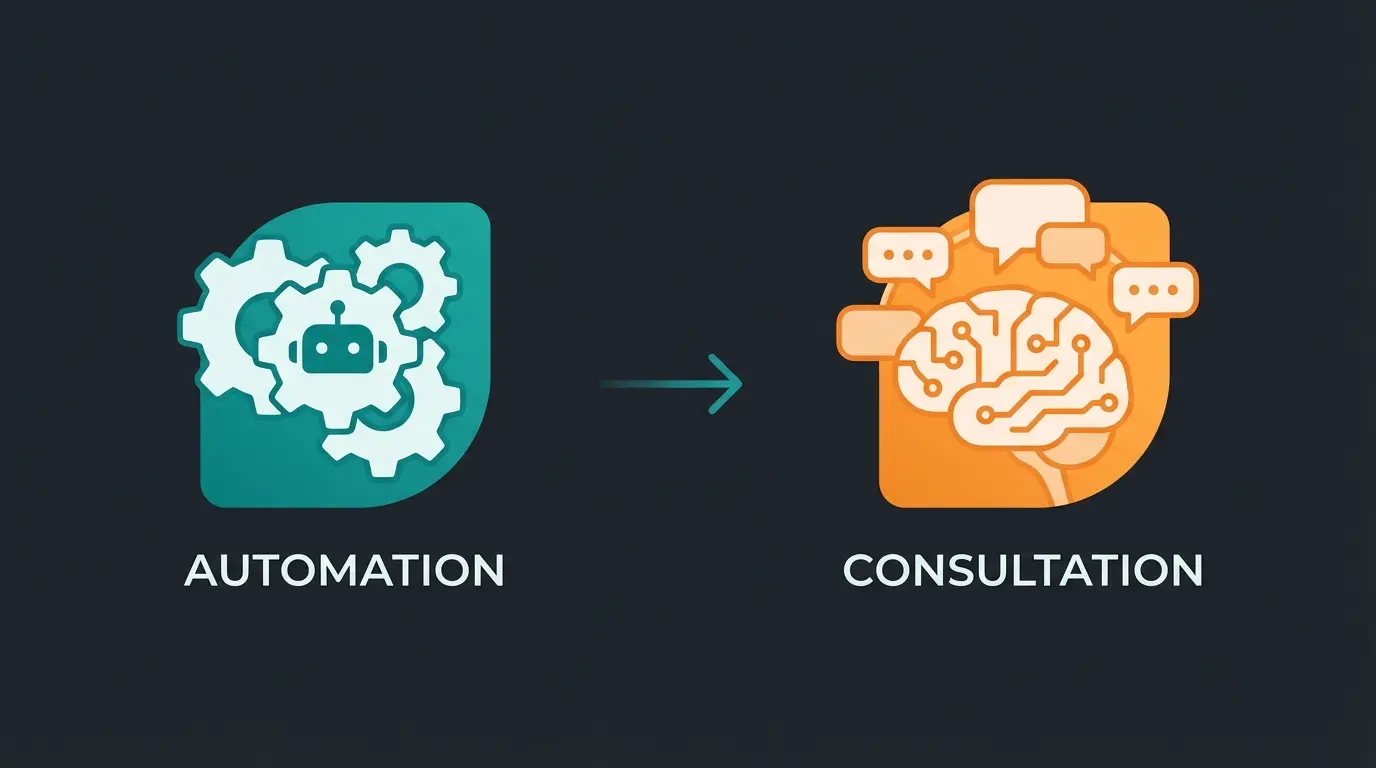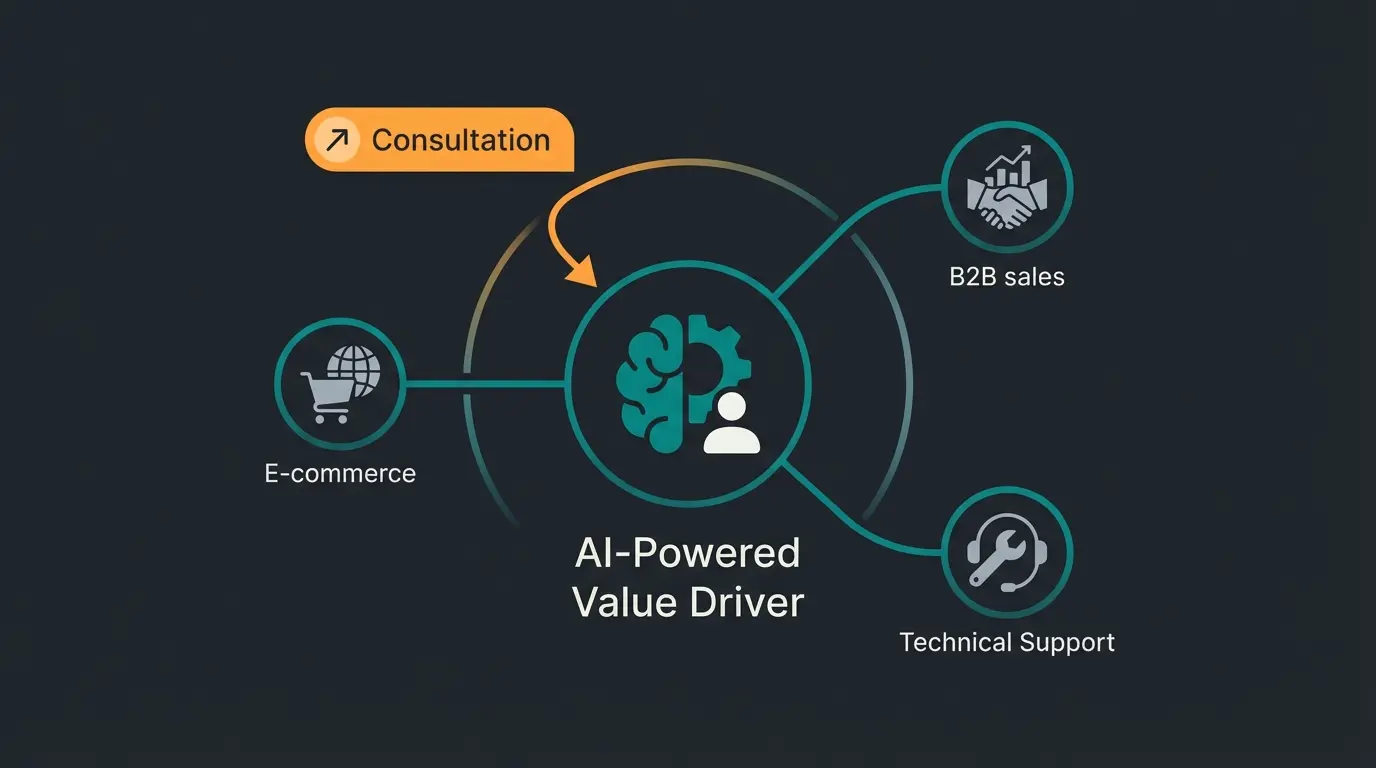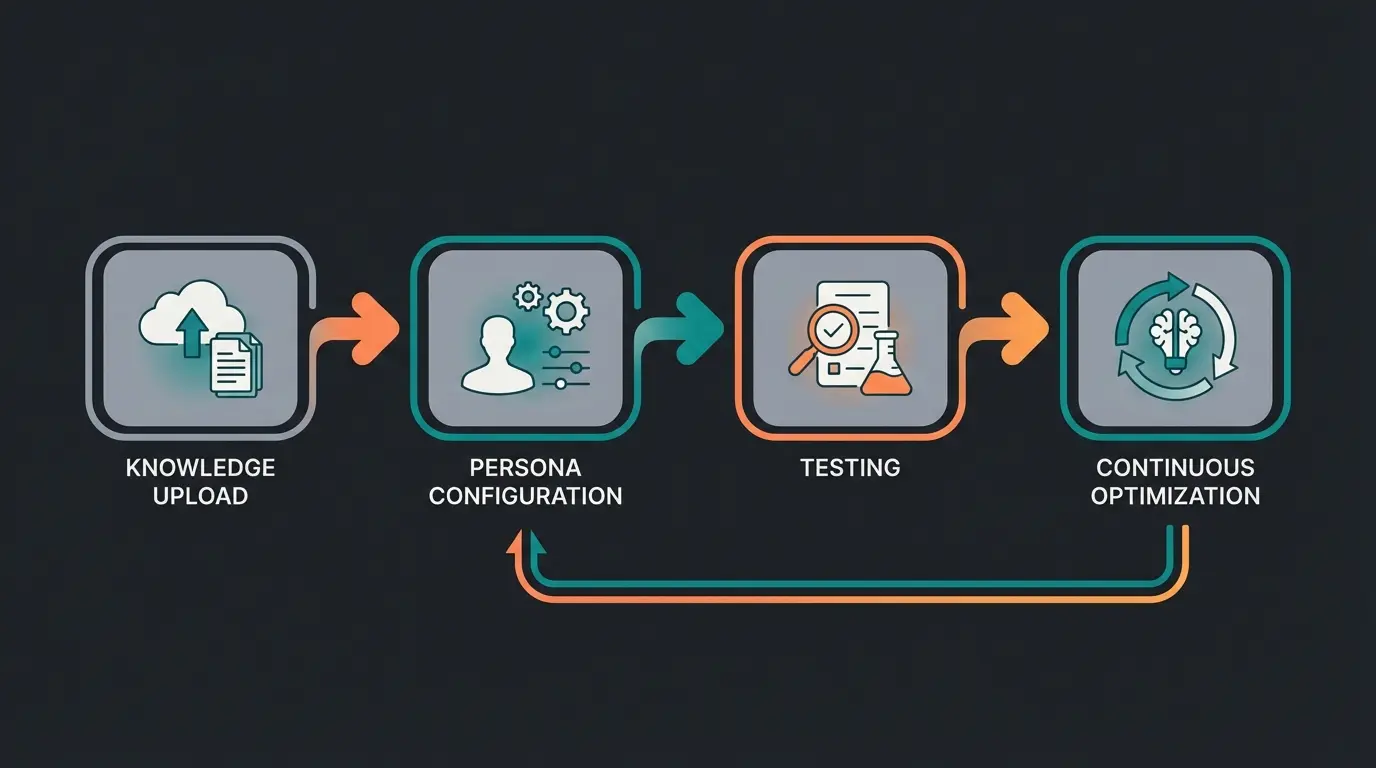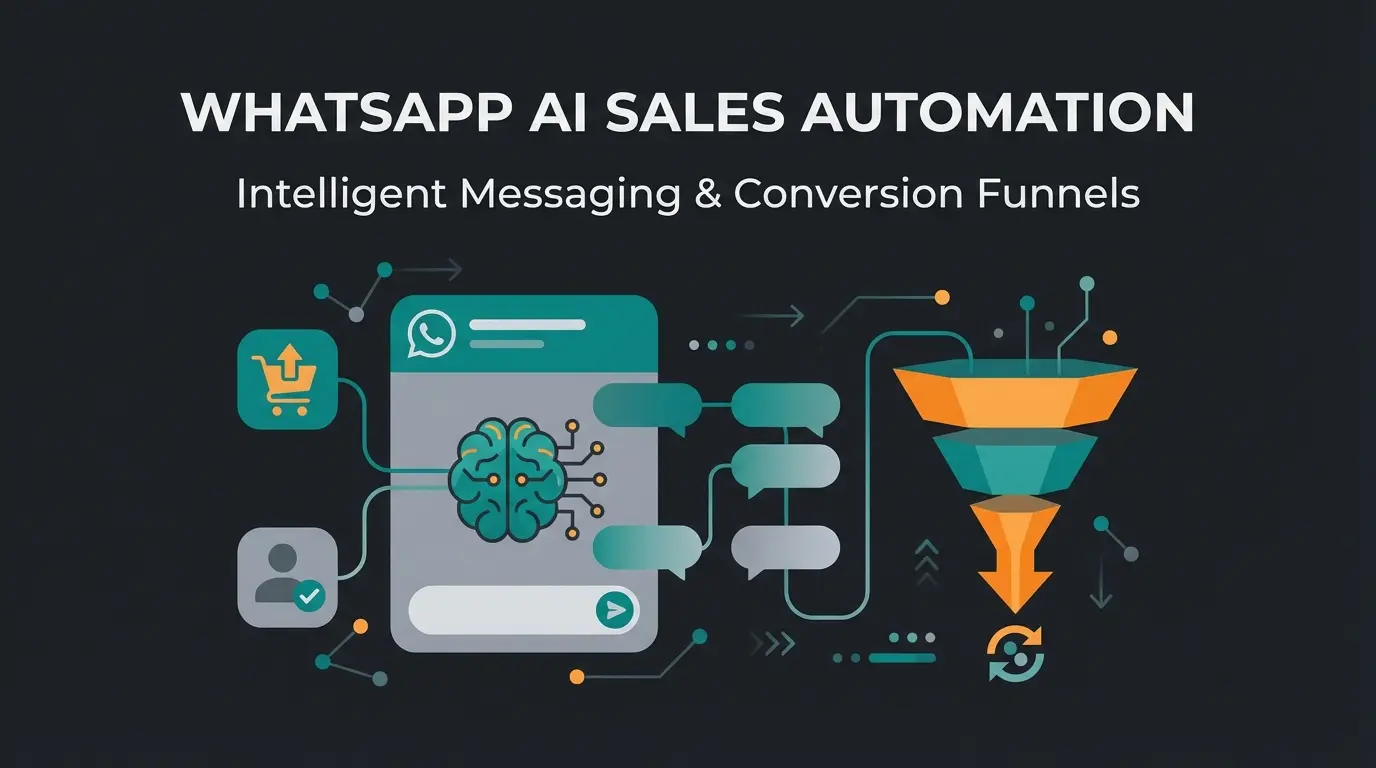Why Traditional Chatbots Are Failing Your Customers
In an era where technological progress transforms our daily lives at unprecedented speed, we are witnessing one of the most fascinating developments in business: the rise of AI employees. These digital workforce members, powered by artificial intelligence, promise to fundamentally transform how we work and serve customers.
But here's the problem most businesses face: their current chatbots are frustrating customers rather than helping them. Standard FAQ bots provide generic responses that feel robotic and unhelpful. Customers abandon their shopping carts. Sales opportunities slip away at 3 AM when no human consultant is available.
The shift we're seeing isn't just about automation—it's about moving from these frustrating FAQ bots to genuine digital employees that can think, advise, and sell like your best human staff. True AI employees don't just copy-paste answers; they consult, recommend, and guide customers through complex purchase decisions.
But what exactly are AI employees, how do they function, and what impact do they have on our working world and customer experience? In this comprehensive guide, we dive deep into the world of AI employees, illuminating their potential, challenges, and future developments—with a specific focus on how they can transform product consultation and drive revenue growth.
What Are AI Employees? Definition and Differentiation
AI employees, also known as digital employees or AI agents, are highly developed software programs powered by artificial intelligence. Unlike conventional AI tools or bots that are often limited to specific tasks, AI employees are designed to take on comprehensive roles within companies. They embody a new generation of automation that doesn't just complete individual tasks but understands and executes entire work processes.
These digital workforce members combine various AI technologies such as machine learning, natural language processing, and Robotic Process Automation (RPA) to handle complex tasks. They can independently execute parts of end-to-end processes while employing a variety of capabilities that were traditionally reserved for human employees.
The Two Levels of AI Employee Capability
Understanding the distinction between different levels of AI employee capability is crucial for selecting the right solution for your business needs:
Slow response times, no immediate assistance, customers wait days for answers
Static information, no personalization, customers must search for answers
Keyword-based, rigid responses, frustrating for complex queries
Interactive, consultative, context-aware advisors that guide decisions
Level 1: Automation encompasses basic task execution—data entry, simple customer support queries, and repetitive administrative work. Many businesses stop here, missing the true potential of AI.
Level 2: Cognition and Consultation represents the breakthrough capability. At this level, AI employees understand customer needs, ask qualifying questions, and recommend appropriate solutions. This is where AI transforms from a cost center into a revenue driver. For example at Qualimero, these advanced AI consultants use generative AI models to create dynamic, context-relevant content and guide customers through complex purchase decisions.

How Do AI Employees Work? The Technology Explained
The functionality of AI employees is based on a combination of advanced technologies working together to create intelligent, responsive digital consultants:
- Machine Learning (ML): AI employees can learn from experiences, adapt, and improve their performance over time. This enables them to work increasingly efficiently and effectively, continuously refining their product recommendations and consultation quality.
- Natural Language Processing (NLP): This technology enables AI employees to understand and process human language. They can interpret instructions, answer questions, and even conduct natural conversations that feel human rather than robotic.
- Robotic Process Automation (RPA): AI employees use RPA to automate repetitive, rule-based tasks. This can include filling out tables, sending emails, or creating content templates—freeing up time for more valuable customer interactions.
- Generative AI: Advanced AI employees utilize generative AI models to create dynamic and context-relevant content. This capability allows them to conduct personalized customer interactions, generate tailored responses, and transform complex information into understandable recommendations.
- Large Language Models (LLMs): These enable AI employees to understand and generate complex language patterns, which is essential for many tasks in communication, content production, and most importantly, consultative selling.
The combination of these technologies enables AI employees to handle a broad spectrum of tasks, from simple administrative activities to complex analyses and creative processes. But most importantly, they can engage in genuine consultation—understanding what a customer truly needs and guiding them to the right solution.
Standard Chatbot vs. AI Sales Consultant: The Difference
This is where most businesses get it wrong. They implement a basic chatbot and wonder why customers are frustrated and conversions don't improve. The difference between a standard bot and an AI sales consultant is like the difference between a vending machine and a knowledgeable shop assistant.
| Feature | Standard Chatbot | AI Sales Consultant |
|---|---|---|
| Response Type | Keyword-based, rigid scripts | Context-aware, dynamic conversations |
| Customer Interaction | Answers 'What is the price?' | Asks 'What do you need this for?' |
| Product Discovery | Shows list of all products | Recommends specific products based on needs |
| Learning Capability | Static, requires manual updates | Continuously learns and improves |
| Customer Experience | Frustrating, feels robotic | Helpful, feels like expert consultation |
| Business Impact | Cost reduction focus | Revenue generation through better advice |
| Setup Complexity | Template-based, quick setup | Requires knowledge base and persona definition |
| Flexibility | Breaks with unexpected questions | Handles complex, nuanced inquiries |
A Real-World Consultation Scenario
Let's illustrate this with a practical example. Imagine a customer looking for hiking boots:
The AI consultant doesn't just show products—it understands the customer's context, asks qualifying questions, and provides expert recommendations. This is the sales psychology that drives conversions. Similar to how AI employee Flora provides product consultation, smart AI consultants guide customers through complex purchase decisions rather than overwhelming them with options.
Where AI Employees Deliver Maximum Value
While AI employees can be deployed across various departments, they deliver the most significant ROI in customer-facing roles where consultation quality directly impacts revenue:
E-Commerce and Retail: Product Consultation
In the role of an AI sales consultant, digital employees can process customer inquiries, advise on products, and even conduct sales conversations. They can analyze customer preferences, provide personalized recommendations, and optimize the entire sales process. Unlike basic chatbots, AI consultants focus on guiding purchase decisions—understanding needs, recommending solutions, and increasing both conversion rates and basket sizes.
The key difference: instead of focusing on cost savings through automation, AI consultants focus on revenue generation through better advice. A customer who receives expert guidance at 3 AM is a customer who buys rather than abandons their cart.
B2B Sales: Intelligent Lead Qualification
In B2B contexts, AI employees excel at pre-qualifying leads with intelligent questions. Rather than simply collecting contact information, they engage prospects in meaningful conversations that identify pain points, budget constraints, and decision-making timelines. This allows human sales teams to focus their energy on the most promising opportunities.
Technical Support: Consultative Problem-Solving
Beyond simple troubleshooting, AI employees can handle complex technical support scenarios. They don't just ask 'Did you restart it?' They understand the context, ask diagnostic questions, and guide customers through sophisticated problem resolution. Similar to AI employee Theresa at marta, an AI support specialist increases efficiency, reduces costs, and improves resolution quality while allowing human teams to focus on complex escalations.

Experience how a digital expert consultant can transform your customer interactions and drive revenue growth with intelligent product recommendations.
Start Your Free TrialAdditional Application Areas for AI Employees
While product consultation delivers the highest ROI, AI employees provide value across multiple business functions:
Human Resources and Recruitment
AI employees can revolutionize the recruitment process by screening applications, conducting initial qualification conversations, and keeping candidates informed. They coordinate appointments, maintain applicant engagement, and deliver valuable data analytics. An AI recruiter can increase efficiency, reduce costs, and improve candidate quality while allowing the HR team to concentrate on strategic tasks and relationship building.
Finance and Accounting
In the finance sector, AI employees can perform complex calculations, analyze financial data, and create reports. They can assist with bookkeeping, process invoices, and even support financial forecasting. Digital cash-application specialists can optimize the order-to-cash process, reducing errors and accelerating payment cycles.
Marketing and Content Creation
AI employees can help develop marketing strategies, analyze data to identify target audiences, and support content creation. They can compose social media posts, optimize email campaigns, and create personalized marketing materials that resonate with specific customer segments.
IT Support and Cybersecurity
In the IT domain, AI employees can assist with troubleshooting, monitor systems, and even detect potential security threats. They can automatically create, prioritize, and resolve tickets, significantly increasing IT support efficiency and reducing response times.
Key Benefits of AI Employees for Your Business
The integration of AI employees into companies brings numerous advantages that extend beyond simple cost reduction:
Expert consultation available around the clock, capturing sales at any hour
Handle unlimited customer interactions without quality degradation
AI never forgets product details, specs, or compatibility requirements
Businesses report significant uplift through better customer guidance
- Productivity Enhancement: AI employees can work around the clock without requiring breaks or vacation. They can process numerous tasks simultaneously, significantly increasing overall company productivity.
- Cost Efficiency: For many companies, particularly startups and small businesses, AI employees offer a cost-effective alternative to human employees for certain tasks—while actually generating revenue through better consultation.
- Error Reduction: AI employees are less prone to human errors, especially in repetitive or data-intensive tasks. This can improve work quality and consistency across customer interactions.
- Scalability: AI employees can be easily scaled to handle peak times or growth phases without incurring additional personnel costs or training time.
- Data Processing and Analysis: AI employees can quickly process and analyze large amounts of data, leading to better insights and informed decisions about customer preferences and behavior.
- 24/7 Expert Consultation: Unlike basic availability, AI employees provide expert-level advice around the clock—active sales consultation at 3 AM, not just automated responses.
- Focus on Strategic Tasks: By taking over routine tasks and standard consultations, AI employees enable human employees to concentrate on more creative, relationship-building, and strategically important activities.
Challenges and Considerations for Implementation
Despite the many advantages, deploying AI employees also brings challenges and considerations that must be addressed:
- Job Displacement Concerns: One of the biggest worries is that AI employees could replace human jobs. It's important to emphasize that AI employees are intended as a complement to, not a replacement for, human workers. They handle routine consultations while humans manage complex relationships.
- Data Protection and Security: AI employees have access to sensitive company and customer data. Robust security measures must be implemented to prevent data breaches and maintain customer trust.
- Ethical Considerations: The use of AI in the workplace raises ethical questions regarding decision-making, accountability, and potential bias in AI systems that must be actively monitored.
- Integration Challenges: Integrating AI employees into existing business processes and cultures can be challenging and requires careful planning and change management.
- Technical Limitations: Despite their advancement, AI employees still have limits regarding creativity, empathy, and complex problem-solving in completely unstructured situations.
- Technology Dependency: Excessive dependence on AI employees could make companies vulnerable to technical disruptions or system failures—backup plans are essential.
- Training and Adaptation Needs: Human employees must learn to work effectively with AI colleagues, requiring training and potentially an adjustment of company culture.
How to Implement an AI Employee for Product Consultation
Successfully introducing AI employees into a company requires careful planning and execution. Here's a practical roadmap:
Upload product catalogs, PDFs, specifications, and FAQs to create the AI's expertise foundation
Define the consultant's personality—consultative, friendly, professional—matching your brand voice
Set up qualification questions, recommendation rules, and decision trees for different product categories
Test consultation scenarios, refine responses, and ensure smooth handoff to human agents when needed
Step 1: Needs Analysis
Identify areas and processes in your company that would benefit from AI employees, focusing particularly on customer touchpoints where consultation quality impacts revenue.
Step 2: Process Documentation
Document in detail the processes to be handled by AI employees. This is crucial for correct programming and training of the AI. Include your best sales conversations, common customer questions, and product knowledge that drives conversions.
Step 3: Technology Selection
Choose the appropriate AI platform or solution that matches your specific requirements. Look for solutions that focus on consultation capabilities, not just basic chatbot functionality.
Step 4: Integration and Training
Integrate the AI employees into your existing systems and train them with relevant data and information. Upload your complete product catalog, competitive positioning, and consultation best practices.
Step 5: Change Management
Prepare your human employees for collaboration with AI colleagues. Training and open communication are decisive here for successful adoption and team integration.
Step 6: Monitoring and Optimization
Observe the performance of AI employees closely and make adjustments as needed. Track conversion rates, customer satisfaction, and consultation quality metrics.
Step 7: Data Protection and Security
Implement robust security measures to protect sensitive data and ensure compliance with relevant regulations.
Step 8: Continuous Improvement
Use feedback and data to continuously improve your AI employees' capabilities and efficiency. The best AI consultants learn and improve with every customer interaction.

The Future of AI Employees: Trends and Predictions
The development of AI employees is advancing rapidly, and it's expected that their capabilities and application areas will continue to grow in the coming years. Here are key trends and predictions for the future:
- Improved Language Processing: AI employees will be able to conduct more natural and context-related conversations, expanding their deployment possibilities in customer service, sales consultation, and interpersonal communication.
- Enhanced Problem-Solving Capabilities: Through advances in machine learning and AI, digital employees will be able to solve more complex problems and find more creative solutions to customer challenges.
- Emotional Intelligence: Future generations of AI employees could be equipped with improved emotional intelligence, enhancing their ability for empathy and understanding of human emotions during consultation.
- Improved Collaboration: The integration of AI employees into team structures will become smoother, with improved interfaces between human and machine enabling seamless handoffs.
- Specialization: We will likely see increasing specialization of AI employees for specific industries or task areas, with vertical-specific consultation expertise.
- Ethical and Legal Frameworks: With the growing prevalence of AI employees, legal and ethical frameworks for their deployment will also evolve to address accountability and transparency.
- Hybrid Consultation Models: The future of work will likely be characterized by hybrid models in which human and AI employees work closely together, optimally utilizing their respective strengths.
Conclusion: The Future Belongs to Hybrid Consultation
AI employees represent a significant step in the evolution of the working world and customer experience. They offer companies the opportunity to increase efficiency and productivity while simultaneously giving human employees the freedom to concentrate on more creative, relationship-driven, and strategic tasks.
However, the real transformation isn't about automation—it's about augmentation. The most successful implementations don't just save costs; they drive revenue by providing expert-level consultation at scale, 24/7. An AI consultant that understands customer needs, asks the right questions, and guides purchase decisions is worth far more than a simple FAQ bot that frustrates customers.
The integration of AI employees is not a simple process and requires careful planning, ethical considerations, and continuous adaptation. But companies that find this balance and effectively integrate AI employees will secure a significant competitive advantage in the rapidly changing digital economy.
The challenge for companies and society lies in leveraging the advantages of AI employees without losing sight of the human aspects of work. It's about shaping a future where technology empowers us to be more productive, more creative, and more fulfilled in our work—where AI handles product education and routine consultation while humans focus on complex relationships and strategic decisions.
Ultimately, AI employees are not just technological progress but an opportunity to redefine our concept of work and customer service. They challenge us to think about what it means to provide truly excellent consultation and how we want to serve customers in a world where artificial intelligence is an integral part of our business operations. With the right approach and a clear ethical compass, AI employees can become catalysts for innovation, growth, and superior customer experiences.
Frequently Asked Questions About AI Employees
A standard chatbot uses keyword-based, rigid scripts to answer simple questions. An AI employee uses advanced technologies like LLMs and generative AI to understand context, ask qualifying questions, and provide intelligent recommendations. While chatbots answer 'What is the price?', AI employees ask 'What do you need this for?' and guide customers to the right solution.
AI employees are designed to complement human workers, not replace them. They handle routine consultations, product education, and 24/7 availability, freeing human employees to focus on complex relationships, strategic decisions, and high-value interactions that require creativity and emotional intelligence.
Implementation costs vary based on complexity, but AI employees often provide significant ROI through increased conversions, higher basket sizes, and 24/7 expert availability. Unlike traditional automation that focuses on cost reduction, AI consultants focus on revenue generation through better customer guidance.
Basic implementation can take 2-4 weeks, including knowledge base upload, persona definition, and initial testing. However, optimization is ongoing—the best AI consultants continuously learn and improve from customer interactions over time.
Yes, advanced AI employees excel at complex product consultation. They can analyze customer needs, ask qualifying questions about use cases and preferences, compare product features, and provide expert recommendations—often matching or exceeding the consultation quality of average human sales staff.
Stop losing sales to frustrating chatbots. See how an AI expert consultant can guide your customers to the right products, increase conversions, and drive revenue growth around the clock.
Get Started Free
